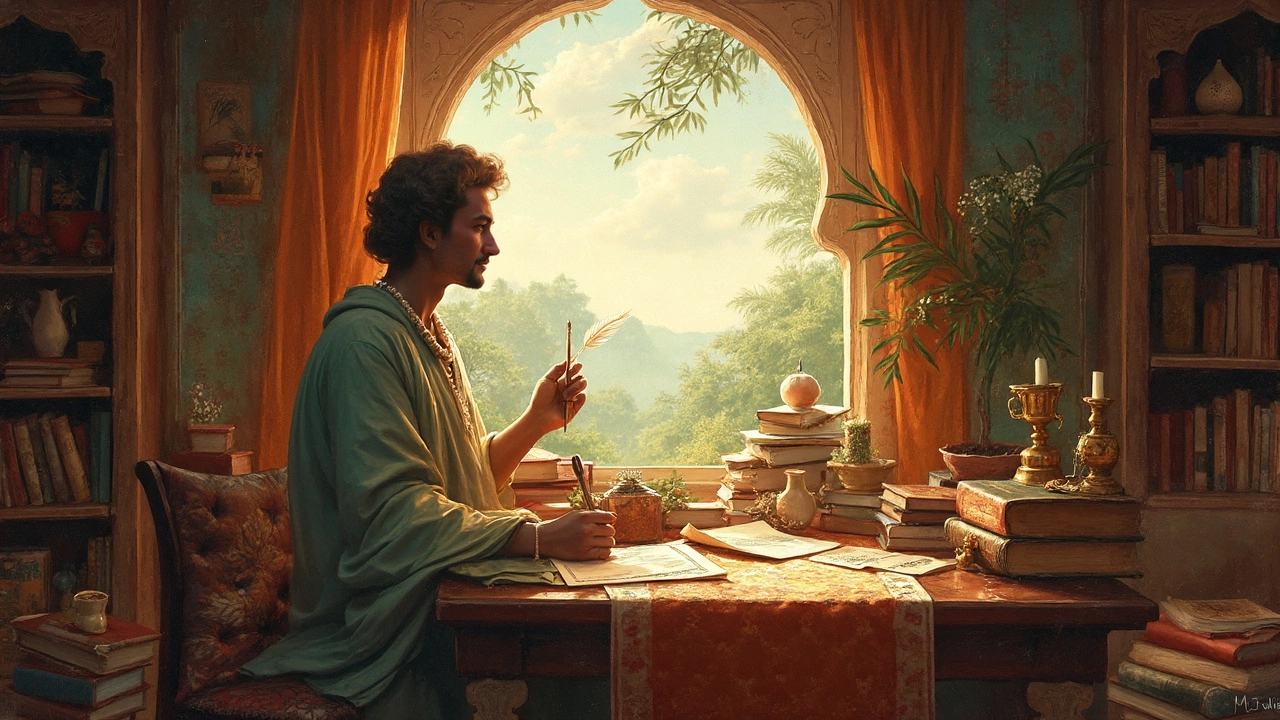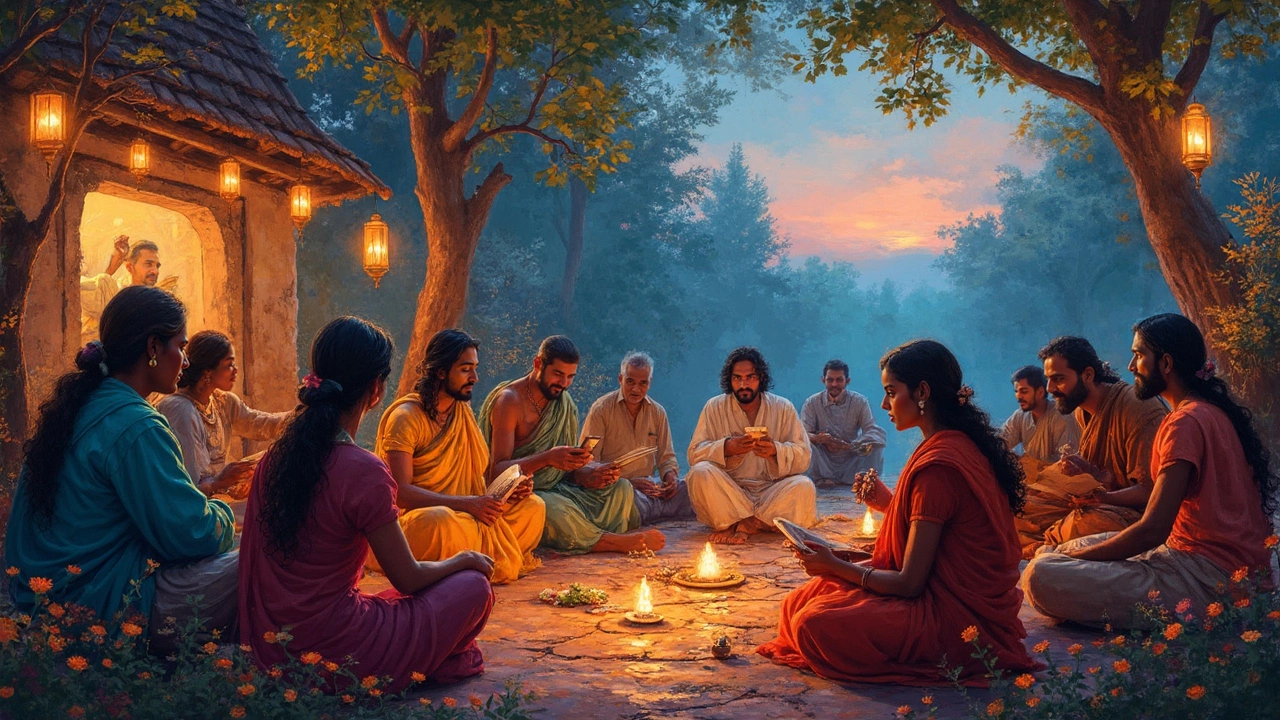Who's the Top Indian Poet in the World?

Indian poetry is like a treasure trove that never stops giving. With roots that dig deep into rich history and culture, it’s hard not to be wowed by its diversity and depth. If you're trying to pick out the best Indian poet, you're diving into a sea of talent and brilliance. Who deserves the top spot? Well, let's take a look at some of the heavy-hitters.
Everyone knows Rabindranath Tagore, right? The dude not only snagged a Nobel Prize but also gave the world timeless works that are still buzzing in everyone’s ears. His words weren't just about pretty metaphors; they were about life, society, and everything in between. Even today, his poems speak to the heart, cutting across cultures and generations.
- The Rich Tapestry of Indian Poetry
- Rabindranath Tagore: The Worldwide Icon
- Modern Voices: Arundhathi Subramaniam
- Influence and Legacy of Indian Poets
The Rich Tapestry of Indian Poetry
India's poetry is like a colorful quilt—it’s vibrant, diverse, and super intricate. This legacy goes way back, starting with classical works like the Vedas and the Mahabharata, written thousands of years ago and still cherished today. With a mix of hundreds of languages across the country, Indian poetry bursts with distinct rhythms and styles.
Do you know what makes Indian poetry truly special? It’s the way it captures life’s beauty, struggles, and everything in between. From spirituality and nature to political thoughts and love—themes are as varied as the people themselves. A cool thing is how it links the past with the present, making age-old ideas feel fresh and new.
As the famous Indian poet A.K. Ramanujan once put it,
"A poem is a mode of reality, arranged by language—an act of consciousness."This shows how deeply intertwined poetry and life are in India, giving insights and reflections that ring true even today.
Speaking of recognition, India has produced poets who’ve made waves far beyond its borders. Rabindranath Tagore, anyone? Winning that Nobel Prize in 1913 for Literature was a game-changer, putting Indian poetry on the global map and inspiring generations who followed.
And get this, Indian poetry doesn't just sit on a page. It’s performed in music, plays, and even Bollywood! The nation’s love for words is evident everywhere, from songs to street performances. This versatility is part of what makes it resonate with people from all walks of life.
With an array of regional poets bringing their own vibe and flair, Indian poetry is always evolving. Whether it’s the soul-stirring couplets of Mirza Ghalib or the contemporary edge of Arundhathi Subramaniam, there's always something new to discover in this rich tapestry.
Rabindranath Tagore: The Worldwide Icon
When talking about Indian poets who have made a splash on the global stage, Rabindranath Tagore is the first name that pops up. Born in 1861 in Calcutta, Tagore was not only a poet but also a philosopher, artist, and musician. He penned down the Indian national anthem, 'Jana Gana Mana', and his influence stretches beyond poetry into politics, education, and the arts.
Tagore was the first non-European to win the Nobel Prize in Literature in 1913. Can you imagine the impact? He blew audiences away with 'Gitanjali', a collection of poems that embraced the human experience and spirituality in a whole new light. His lyrical quality and deep thought struck a chord with people across cultures.
Tagore wasn’t just about poetry; he was a true cultural champion. He re-defined education with the founding of Visva-Bharati University, where he aimed to blend the best of Western and Eastern traditions. And here’s a cool fact: He’s one of the few people in the world who has written the national anthems for multiple countries—India and Bangladesh.
Beyond his achievements, what really puts Tagore in the ‘best Indian poet’ arena is his work’s resonance today. His themes of love, nature, and humanity feel fresh and relevant, no matter the era. This global icon put India on the world literature map, and his impact is still felt worldwide.

Modern Voices: Arundhathi Subramaniam
Arundhathi Subramaniam is shaking up the world of Indian poetry like no other. What makes her stand out is her relatable approach and contemporary voice that resonates with readers across the globe. Born in Mumbai, she brings a unique blend of urban sensitivity and spiritual exploration to her work, crafting poems that address everything from identity and place to love and existential angst.
One of her most popular collections, "When God is a Traveller," received international acclaim and even bagged the prestigious Khushwant Singh Prize for Poetry. Her work is known for its accessibility; it speaks directly to the reader without getting lost in complex language. Plus, Indian myth and folklore often weave through her lines, giving her poetry a timeless and universal appeal.
Besides being a poet, Subramaniam is also an accomplished editor and critic. Her editorial work includes curating anthologies of Indian poetry which showcase the vibrant diversity of voices in the country. She's not just creating; she's also fostering a platform for others to shine, which truly cements her role as a key figure in modern Indian literature.
It's not all academic—Subramaniam's poetry reflects her experiences and observations. Whether she's exploring the chaos of city life or the tranquility of a quiet moment, her poems feel like conversations, almost as if she's chatting with you over coffee. Her work brings to light the beauty and contradictions of our fast-paced world, making her a relatable and cherished modern Indian poet.
Influence and Legacy of Indian Poets
Indian poets have left an indelible mark on literature globally. One of the most remarkable aspects of their influence is how their work resonates across cultures, often blurring geographical and linguistic boundaries. Take Rabindranath Tagore, for instance. His contributions weren't just confined to poetry. He penned novels, essays, and even composed songs, including India's national anthem. Tagore was like a bridge, connecting India with the rest of the world through his art.
Another noteworthy figure is Rupi Kaur, who brought Indian poetry into the modern digital age. With her straightforward yet profound verses posted on social media, she's attracted a massive following. Her influence shows how short poetry can capture the complexities of human emotion and experience in just a few lines. Arundhathi Subramaniam is also a name that's hard to miss, blending the traditional with the contemporary in her own unique voice.
What really stands out about Indian poets is their ability to adapt and innovate while staying grounded in cultural roots. They often address universal themes like love, loss, and identity, which strike a chord across the globe. This universality is a significant part of their legacy.
The impact these poets have had on literature is not just seen in the number of books sold or the awards won. It's in the conversations sparked, the souls touched, and the inspiration seeded in budding poets around the world.